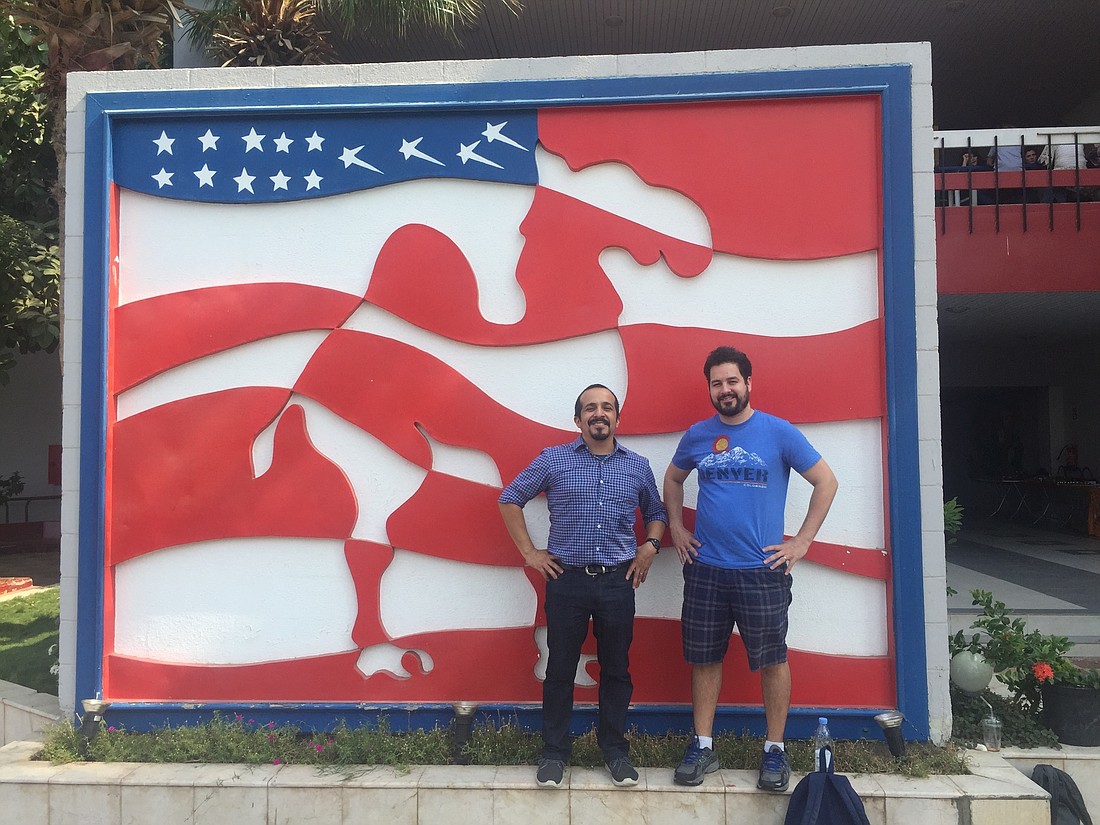- November 23, 2024
-
-
Loading

Loading

Did you hear the one about the improv comedian who went to Saudi Arabia?
Seriously. No joke.
Will Luera is the funnyman in question.
Back in 2013, he was the artistic director of ImprovBoston. In that same year, American Voices toured a group of young Iraqi break-dancers across the United States. With Luera’s help, the urban dancers made Boston their final stop. He wanted to return the favor, and asked if he could do an improv comedy tour of Iraq. His contacts at American Voices said that just wasn’t possible. But they promised stay in touch.
Luera become Florida Studio Theatre’s director of improvisation in 2014. Earlier this year, American Voices called back. They told him a comedy tour was possible in Saudi Arabia, with the cooperation of the American embassy and consulates. Luera worked out a program and wound up on a plane to Saudi Arabia with Ahmed Bharoocha, the popular Arab-American comic, writer and actor.
After two flights, 14 hours in the air and another four hours on layover, two jet-lagged comedians wound up in the Riyadh airport. Luera quickly texted their American embassy expediter: “How do we get in? What do we say?” The two-word reply: “Cultural Exchange.” Those magic words got them into the terminal.
“It looked like any other modern airport,” Luera says. “They had a Dunkin’ Donuts, Tim Horton’s, Starbucks — all the modern conveniences.”
Before long, the expediter arrived in person to take them to the hotel. Luera had been expecting a typical diplomatic limousine. But their transportation was a heavily armored (and armed) van. And that’s how they rolled for the rest of the trip.
That night, they had their first gig. Not at a comedy club, but the American embassy. The audience was a mix of embassy staff and invited guests, mostly young students and artists, both men and women. It was Luera’s first exposure to a large group of Saudi civilians, and their first experience of an American improv comedian.
They watched with polite expressions and expectant eyes.
Luera opened with the standard question: “Who here has done improv?”
“I ask that in every improv workshop,” he says. “Usually a lot of hands shoot up,” he says. “Normally, it’s about 60 or 70% of the audience. This time, I got maybe two hands.”
But they weren’t shy.Luera was pleased at the young Saudis’ willingness to jump into a spontaneous, new art form. He was especially happy that his first audience participant was a woman.
The show wrapped up. Embassy security efficiently herded the audience out the door. But the woman wanted to keep improvising scenes and getting into characters. “The improv bug definitely bit her,” says Luera. “She was hooked.”
What was his impression of the Saudi Arabia improv community?
At the time of his visit, the cities of Riyadh and Dhahran didn’t have one. Jeddah had an embryonic improv scene. It had a single comedy club — Al Comedy Club, which offered a single monthly improv night. A few of its stand-up comics stepped up to the mic. Their training was second-hand, based on clips on YouTube and social media. Old bits from “Whose Line is it Anyway?” were the best they could get. They lacked contact with seasoned performers. Until Luera got there.
“I did a few games they’d never done before,” he says. “They were excited to try, eager to experiment and hungry for more. When we finally left, they were all saying ‘Please come back.’”
Response in Dhahran was equally enthusiastic. Luera’s brand of improv comedy wasn’t simply popular. To audiences in Saudi Arabia, it was a totally new phenomenon. They’d never seen anything like it.
“Comedy and live theater in general are still very new in Saudi Arabia,” Luera says. “It’s just not part of the culture. There aren’t even any movie theaters, much less live theater.”
What gets laughs in Saudi Arabia?
“Comedy’s a universal language,” Luera says. “We make jokes about the same things: dating, parents, work, the day-to-day stuff everyone deals with. That’s filtered through cultural differences, but the similarities outweigh the differences.”
The comedian describes Saudi Arabia as “a very old culture, with a young, vibrant population.” Luera experienced less culture shock than he’d expected. Some differences were obvious. Genders were still separated in public places, the American embassy being an exception. Regardless of that division, half of his audiences were women — half of his participants, too. The Arab comedians he encountered weren’t timid, although they steered clear of hot-button political topics. Luera’s comedy wasn’t lost in translation, because most young people spoke English.
“The reality of a foreign culture never fits your expectations,” he says. “After a day or two, all your stereotypes melt away.”
Luera hopes the improv seeds he’s planted will continue to grow. Thanks to the success of his trips, the American embassy and consulates in Pakistan are also talking about a follow-up visit. His Saudi Arabian contacts are also eager to bring him back. And they still keep in touch, via email and Facebook.
“The woman who came up that first night still communicates with me,” Luera says. “She even started an improv club—and wants to collaborate on an improv show the next time I visit. That’s very exciting to have that kind of effect.”